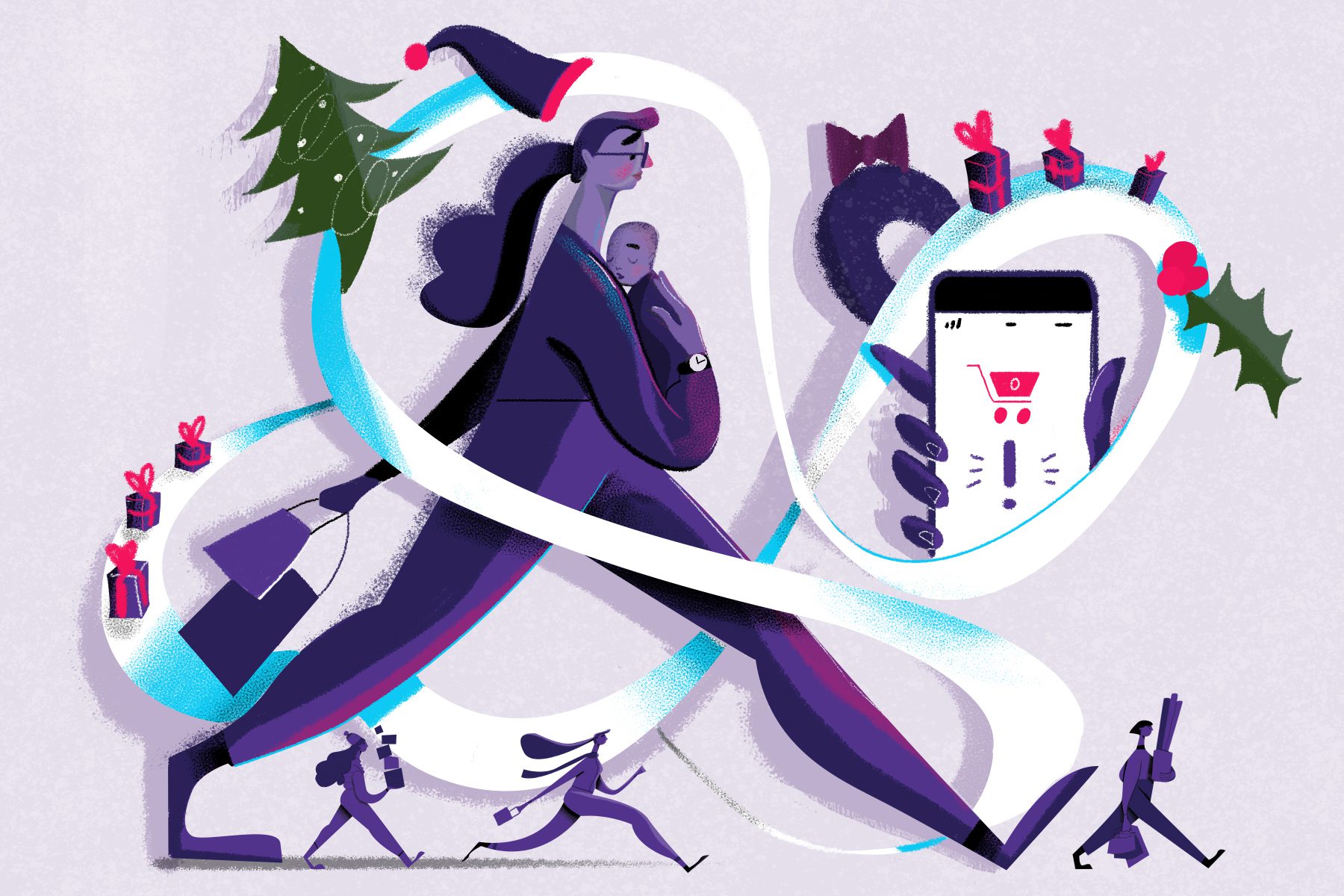Stretched thin after nearly two years in a pandemic, some women and nonbinary people tell The 19th that they just don’t have the emotional space, time, or financial means to buy gifts for their friends and loved ones right now.
They’re not alone, according to Deloitte’s annual holiday retail survey: 11.5 percent of respondents said they don’t plan to spend money at all for the holidays this year — the highest number that Deloitte has found it started tracking the data in 2011, per CNBC.
As The 19th reported last holiday season — the first of the COVID-19 pandemic — women’s load of invisible labor is especially high during the holidays. This year, rising costs for many goods and a supply chain crisis have only compounded that load. For some dealing with grief, financial stress, and navigating celebrations and gift-giving, something has to give.
The 19th spoke to multiple people who are struggling with deciding who to buy presents for and how much to spend, as well as to experts for advice on how they can talk to their loved ones about it.
Lauren Krouse, a 29-year-old freelance writer living outside of Harrisonburg, Virginia, told The 19th that she and her fiance, who is also a freelance writer, decided to forgo giving each other gifts this holiday for the first time.
Krouse said the idea came to her after thinking about how busy and stressed they’d both been lately — and about the financial constraints brought on by losing work during the pandemic.
“Can we just give each other the space we need to do the work we do and enjoy one really good night of dinner together?” she said. “And my partner was obviously fine with that.”
But talking with her family about nixing gift-giving has to be more delicate, Krouse said. In her family, differences in salary and budget have complicated the shared goal of expressing love to each other and led to emotional conversations about what she can and can’t afford.
“My family’s love language is gift-giving as a whole, and no matter my efforts to suggest alternatives — like getting a nice Airbnb together in the woods — I always end up overspending because it’s just what they want,” she said.
She still got Christmas gifts for her family this year to make them happy, although she’d like their future gift-giving to focus on experience-based and eco-friendly gifts, she said.
Krouse said she and her sister have agreed to focus on experience-based gifts and be more direct in conveying their wishes. Still, at the end of the day, it’s hard to exchange gifts when her own budget is smaller — and when the other person insists on spending more.
“I’m always going to spend less than her because I have less. And I can’t let myself feel bad about that because I think both of us understand that reality,” she said.
Not straining oneself financially to try to get gifts is a form of self compassion, said Dr. Michelle Martel, director of clinical training at the University of Kentucky’s psychology department.
“I think if you can’t afford it, just don’t do it and just explain to people why you’re not doing it,” she said. Let them know that it doesn’t have anything to do with them — that it’s simply a stressful time, she recommended. Using “I statements” and explaining how you feel, while being open and direct, is the best policy, she said.
A great gift can also be kind words, taking care of something on their to-do list or sending a card, she said.
The women who spoke to The 19th talked about how, in addition to their regular workdays, bills, and managing high costs of living, they helped care for relatives – another piece of their lives that, however willing they were to give, still takes a toll emotionally and often financially.
Along with caregiving and household chores such as cleaning and cooking, taking on gift-giving responsibilities can be considered another piece of invisible labor that’s often left to women to handle, Martel said.
Planning ahead and having open discussions with partners about their expectations around the holidays can help offset that tendency, she said.
Krouse is currently on caregiving leave from taking care of her grandmother until the spring, when her aunt serves as caregiver for about half the year. The arrangement started during the pandemic — and when it got hard a few months ago, her fiance helped balance their shared labor by taking up some household chores, like walking the dog twice a day.
The one imbalance of labor in their five-year relationship comes during the holidays, she said — which isn’t a source of resentment, but is still something she has to contend with.
“My partner and I are pretty good about balancing labor in our household, but his family doesn’t celebrate holidays due to their religion, so it just feels like this is always going to be something I have to carry myself,” Krouse said.
It’s a different time of year for me. It’s just hard not to focus on the losses.
Jay Betts, who lost several family members over the past two years
Better Life Lab, a program focused on gender equity at the nonpartisan think tank New America, recommends that families ask each other: “How do you want to feel during the holidays?”
“When the family is together discussing the holiday, the mom gets to say that she wants to enjoy the day and that she doesn’t want to be the stressed-out person yelling at everybody,” Better Life Lab’s director, Brigid Schulte, told CNN when discussing ways to lessen the holiday workload for moms.
Working parents should try to make as much time for themselves during the holidays as they can, Martel said, even if it’s only making themselves tea after the kids go to bed or taking a few extra minutes in the shower or bath for time alone.
“Even small things like that can make a big difference in terms of turning down the stress level a notch,” she said. “And just remember that everyone feels the pressure of the holidays, even people that really enjoy the holidays and love them.”
For Jay Betts, a 36-year-old activist for Black LGBTQ+ rights living in Los Angeles, caregiving this holiday looks like spending time with their family after a year of sustained grief. They lost multiple family members this year and in 2020, not all due to the COVID-19, they said.
“It’s a different time of year for me,” said Betts. “It’s just hard not to focus on the losses.”
This year was Betts’s first Thanksgiving without her grandmother. She dedicated that weekend to spending time with the family she still has — which meant she got to meet her niece and nephew in-person for the first time in Richmond, Virginia.
Betts said they plan to stay in Los Angeles for Christmas, to help a friend with a documentary, while most of the family drives down to Dallas for the holiday. For Kwanzaa, during which children are meant to be the ones primarily getting gifts — and gifts aren’t meant to be excessive or mandatory — Betts got several children’s books for their nephew and his siblings.
But the most important gift for Betts this year is spending time with the memories of their passed family members, they said.
“I think there’s that age we get to when we start to look at more of the obituaries than the birthdays, but looking at how your family grows both spiritually, emotionally, and in numbers, has been a guiding light for me in this dark,” they said.
Martel said that those dealing with grief can change up their holiday plans if they don’t want to revisit those old memories, or if those memories are still too painful. Visiting a different relative’s house, traveling instead of staying at home, or having Christmas brunch instead of Christmas dinner are a few options, she said.
At the end of the day, Martel said she always reminds people struggling during the holidays that they’re not alone — because a lot of people are struggling right now, whether it’s due to loss or financial stress or being overwhelmed by plans to meet loved ones in groups, and it’s only been made worse by the pandemic.
And when so many people are carrying emotional and financial burdens, many of them made worse by a pandemic that they didn’t expect to be enduring for another year, it makes sense to find one less thing to worry about.







